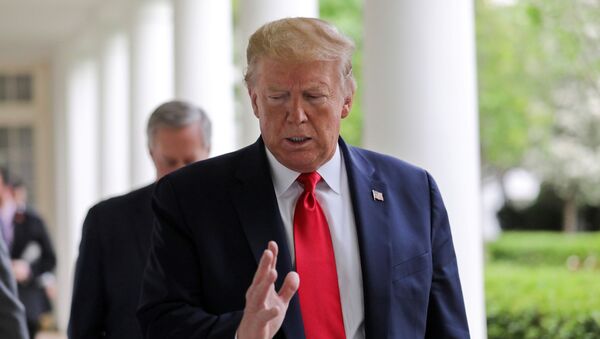The Trump administration presented a report titled "U.S. Strategic Approach to the People’s Republic of China" to members of Congress on 20 May, saying that it acknowledges the existence of strategic competition with Beijing and will protect its interests accordingly in light of a direct challenge posed by the Chinese Communist Party (CCP).
Dr Ching Chang, a research fellow at the Society for Strategic Studies and a leading Chinese military and strategy analyst in Taiwan, has shared his views on the recently escalated Sino-American tensions, which were exacerbated by Washington's accusations against Beijing of "mishandling" the pandemic.
Sputnik: How would you explain the acceleration in the split between the US and China and growing criticism from the American side?
Dr Ching Chang: We should very cautiously identify the fundamental Sino-US animosities and the short-term disputes between the US and China in the foreseeable future. Some issues are associated with the temporary political assumptions in the moments of the US election campaign, such as unbalanced trade, blaming the COVID-19 epidemics and commercial competition. Nonetheless, certain matters may seriously affect the global power status in the long run, like influences in international organisations, technology specifications and circulation level rivalry of the currency.
The criticism from the United States is really not the dominant factor since most of the nations in the world may execute their own national interest calculus and may ignore these US viewpoints. However, the privileges of setting the institutions in the international community and supports as well as consents from other nations in the world will decide the future leadership position. Beijing has a strong ambition to embrace globalisation and Washington, by contrast, has a firm intention to secure its own superiority above other nations and less willingness to commit to the world order as before. This difference in mentality is the eventual factor that is accelerating the rivalry between Beijing and Washington.
Sputnik: The 20-page report expands on President Donald Trump's get-tough rhetoric that he hopes will resonate with voters about China's handling of the coronavirus outbreak. How viable do you consider such expectations to be?
Dr Ching Chang: We should have no surprise about the base-tone of this report. This is actually very sensible for serving Trump’s election campaign strategy. The matter now is not literally how you say and what you say at the moment, but the consequences of abolishing the epidemic control after many states gradually lift the shut-down status and resume normal life. Six months are still left before the voting date. At the moment, President Trump holds the privilege of dominating the information and public presences. His competitor, Mr Biden, is in an inferior position to provide his perspectives to the American general public. This situation will be changed after the election campaign starts to get hot whilst most of the states lift the manoeuvre restrictions.
Whether Trump’s scheme of mass distraction can be viable is hard to say at the moment. Trump is a very agile politician. Should he change his statements or positions in the following months may indicate whether he may still believe that by tarnishing Beijing he could save his political future. We should never be surprised that such a hairpin style turn may occur before the vote. Trump will do whatever it takes to get the votes he would like to have. The moral standard of a businessman may impress us all the time.
Sputnik: The Trump administration sees "no value" in engaging with Beijing for symbolism and pageantry, according to the report. What are the chances of the two countries restoring relations to pre-COVID levels? If this isn’t likely, then what kind of rhetoric do you expect in the short-run?
History is a dynamic process. All the progress may lead us to a totally new situation. We should never expect to restore anything that originally existed before. Given the international mechanism and treaties withdrawn by Trump’ administration so far. No matter who can be the successor of Mr Trump, the next US president, next year or another four more years, will need to face a world needing restorations after Trump’s era. This is exactly the reason why the leadership in Beijing rarely says anything to Mr Trump’s comments on his Twitter. He should ask who feels “no value” to engage with him and why they think so.




